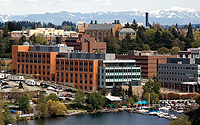- about
- speakers
- location
- schedule

The UW Department of Genome Sciences was formed in September 2001 by a merger of the Departments of Genetics and Molecular Biotechnology and has grown over the past ten years into a world pioneer of genome interpretation and technology innovation. Our research is at the forefront of endeavors to unlock the secrets of the genome.
We invite you to attend our 10th anniversary symposium, "The Future of Genome Sciences", on Tuesday, October 18 (10:30 - 5:00) and Wednesday, October 19 (10:30 - 6:30), in Foege Auditorium. Registration is not required.
symposium poster (pdf) |
 Dr. David Botstein, Princeton University Dr. David Botstein, Princeton University
The goal of our research is to understand fully how cellular growth rate is controlled by circumstances. We are exploiting newly available genomic sequences and developing novel technologies to achieve this goal. Ultimately, we would like to produce a theory that can predict the responses of cells to all kinds of environmental perturbation.
website |
 Dr. Carlos Bustamante, Stanford University Dr. Carlos Bustamante, Stanford University
My research focuses on analyzing genome wide patterns of variation within and between species to address fundamental questions in biology, anthropology, and medicine. My group works on a variety of organisms and model systems ranging from humans and other primates to domesticated plant and animals. Much of our research is at the interface of computational biology, mathematical genetics, and evolutionary genomics.
website |
 Dr. Joseph Ecker, Salk Institute Dr. Joseph Ecker, Salk Institute
Joseph R. Ecker, a professor in the Plant Biology Laboratory, is one of the nation's leading authorities on the molecular biology and genetics of plants. Ecker was a principal investigator in the multinational project that sequenced the genome of Arabidopsis thaliana, a modest weed that has become a model organism for the study of plant genetics.
website |
 Dr. Sean Eddy, HHMI Janelia Farm Dr. Sean Eddy, HHMI Janelia Farm
Sean Eddy designs mathematical tools to probe modern genomes, unraveling the structures, functions, and histories of specific genes. In particular, he works to identify genes that make functional RNAs instead of proteins.
website |
 Dr. Jay Keasling, University of California, Berkeley Dr. Jay Keasling, University of California, Berkeley
The research in the Keasling Laboratory focuses on the metabolic engineering of microorganisms for degradation of environmental contaminants or for environmentally friendly synthesis. To that end, we have developed a number of new genetic and mathematical tools to allow more precise and reproducible control of metabolism.
website
|
 Dr. Kathryn Lilley, Cambridge University Dr. Kathryn Lilley, Cambridge University
As head of the Cambridge Centre for Proteomics (CCP), our group provides a proteomics resource for the UK Arabidopsis and Drosophila communities. We are also developing new technologies to solve two especially difficult problems in proteomics: the quantitative analysis of differentially expressed proteins, and the assignment of integral membrane proteins to specific organelles within the cell.
website |
 Dr. Jasper Rine, University of California, Berkeley Dr. Jasper Rine, University of California, Berkeley
The research in my lab is centered on the epigenetic mechanisms by which the information in a genome is expressed in a manner that is stable and heritable through cell division. This issue has led us to discoveries on how specialized domains of chromatin structure are established, maintained and inherited.
website |
 Dr. Barbara Wold, California Institute of Technology Dr. Barbara Wold, California Institute of Technology
A substantial biological challenge is to understand the regulation and execution of developmental decisions that lead from multipotential, undifferentiated precursor cells to their specialized differential products.We are interested in several interrelated aspects of this problem, and we also work to develop new methods for studying it.
website |
 Department of Genome Sciences Department of Genome Sciences
Foege Building S-250, Box 355065
3720 15th Ave NE, Seattle WA 98195-5065
map | driving directions
The symposium will be held in Foege Auditorium (S-060) |
Foege Auditorium (Genome S-060) | no registration necessary
Tuesday, October 18
Morning Session:
10:30 – 11:30: Graduate student and Postdoctoral fellow presentations:
Joe Hiatt, Sharon Greenblum, Sean Schneider, Megan Dennis
Afternoon Session One:
1:00 – 1:05: Opening Remarks, First Session
1:10 – 1:55: David Botstein, Princeton University
2:00 – 2:45: Barbara Wold, California Institute of Technology
Afternoon Session Two:
3:15 – 3:20: Opening Remarks, Second Session
3:25 – 4:10: Carlos Bustamante, Stanford University
4:15 – 5:00: Sean Eddy, HHMI Janelia Farm
Wednesday, October 19
10:30 – 11:30: Graduate student and Postdoctoral fellow presentations:
Doug Fowler, Sara Di Rienzi, Caitlin Rippey, Andrew Stergachis
Afternoon Session Three:
1:00 – 1:05: Opening Remarks, Third Session
1:10 – 1:55: Jasper Rine, University of California at Berkeley
2:00 – 2:45: Joseph Ecker, Salk Institute
Afternoon Session Four:
3:15 – 3:20: Opening Remarks, Fourth Session
3:25 – 4:10: Kathryn Lilly, Cambridge University
4:15 – 5:00: Jay Keasling, University of California at Berkeley
5:00 – 5:45: Audience Discussion with all Eight Speakers
5:45 – 6:00: Closing Remarks, Bob Waterston
|
|
|




